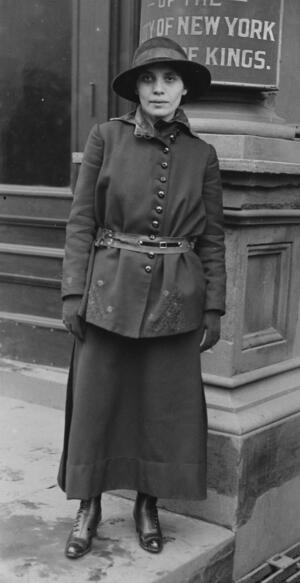Fania Mindell arrested for distributing birth control material
Fania Mindell was only 22 when she became part of a seminal moment in the history of women’s reproductive freedom.
Born in Minsk, Russia on December 15, 1894, Fania emigrated to Brooklyn, New York in 1906 with her family. Fania became the proprietor of Little Russia, a small boutique in Greenwich Village just off Washington Square, which featured curios from Russia, but her true passion was for feminist and progressive causes. As a young political activist in 1916 she met the now famous feminist Margaret Sanger and her sister Ethel Byrne. Together, the three women opened the first birth control clinic in the United States, known as the "Brownsville Clinic" (after the Brownsville section of Brooklyn in which it was located). The clinic’s aim was to educate and distribute birth control materials.
At the time, publishing or selling any material about sexuality or the prevention of pregnancy was a prosecutable offense under the Comstock Act, which made the dissemination of “obscene” material through the mail illegal. The clinic served more than a hundred neighborhood women on its opening day. Mindell administered the storefront clinic during its first week, canvassed the neighborhood with flyers written in English, Yiddish, and Italian, and read birth control literature in Yiddish to Jewish clients. On October 26, 1916, ten days after the clinic opened, an undercover policewoman and vice-squad officers raided the clinic, confiscated an assortment of contraceptives, along with 20 “books on young women,” and arrested Sanger, Byrne, and Mindell. After their arraignment, the three women spent the night in jail and were released the next morning on $500 bail. All three women were found guilty, with Mindell convicted of disturbing the peace and fined $50. Eventually all their verdicts were overturned, and the women’s campaign eventually led to major changes in social policy and to the laws governing birth control and sex education around the world.
Margaret Sanger later became the founder of the American Birth Control League, the precursor to the Planned Parenthood Federation.
Fania Mindell went on to become a costume and set designer for Broadway plays. She also translated Russian plays into English versions, including the premiere of Maxim Gorky’s classic The Lower Depths (Night Lodging). On December 3, 1929 Fania married historian Ralph Edmund LeClercq Roeder, who shared her interest in drama and theater. The couple travelled extensively, eventually settling in Mexico City, where Roeder was honored with Mexico's highest literary award, the Orden del Águila Azteca, for his seminal biography of Benito Juárez. Mindell died in Mexico City on July 18, 1969.
See also: Birth Control Movement in the United States and American Birth Control Movement.
Sources: “October 18: Birth Control in Yiddish,” Jewdayo; “Hobby Lobby: Birth Control and the Law,” Planned Parenthood Advocates of Arizona; “Fania Mindell,” FindAGrave.




